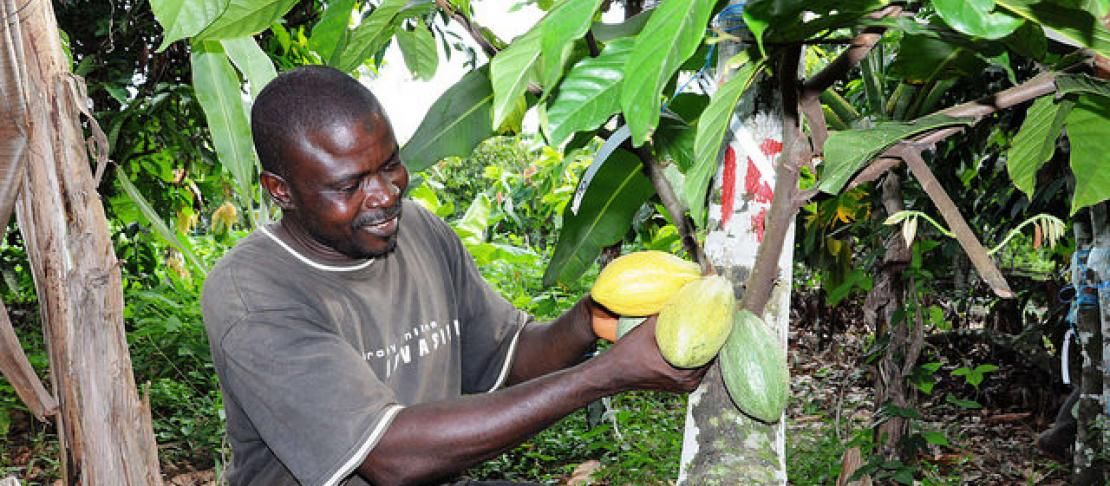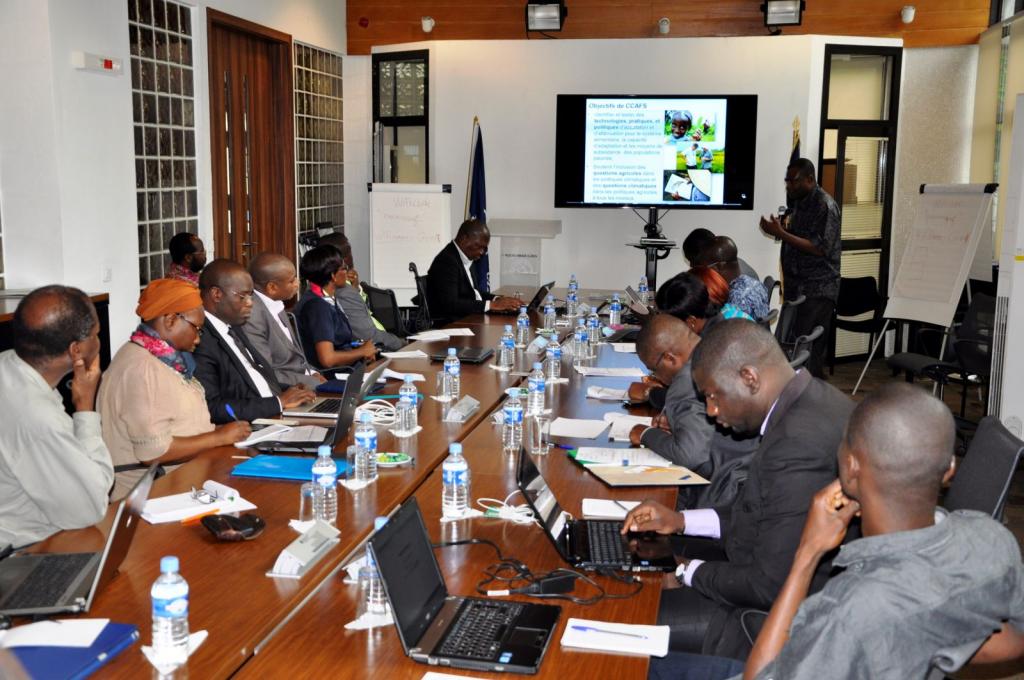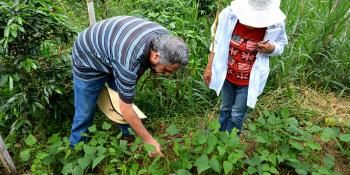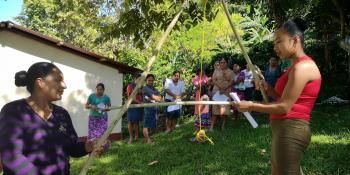Towards climate-smart agriculture in Côte d’Ivoire

To prepare the implementation of climate-smart agriculture, it is necessary to build the capacity of national Ivorian stakeholders.
Agriculture plays an important role in the economic and social development of West African countries. It employs 60% of the working population, and makes a significant contributionto GDP (35%) and export earnings. To continue performing its economic and social function efficiently, West African agriculture needs to address the challenge of climate change.
Climate change poses challenges to agriculture
Climate change poses three major challenges to agriculture, namely:
Feeding an ever-growing population: Estimated at 290 million in 2010, the West African population will more than double by 2050. This will increase food demand from 60% to 80% and require additional resources.
Adapting to climate change: Rising temperatures, less rainfall, more frequent droughts and floods, as well as the proliferation of pests as a result of climate change will lead to low and volatile returns, as well as a sharp increase in the prices of major food crops. Consequently, agriculture needs to adapt to climate change.
Producing while minimizing environmental impacts: Agriculture is the world’s primary source of methane and nitrous oxide emissions, a major source of carbon emissions and the world's leading factor of deforestation. Agriculture and deforestation account for about 30% of global emissions of greenhouse gases. Agriculture is therefore a major element of climate change.
Need for agricultural transformation
To meet these three challenges, it is urgent to adopt climate-smart agriculture (CSA).This is an integrated approach already implemented by the CGIAR Research Program on Climate Change, Agriculture and Food Security (CCAFS) in five pilot countries (Burkina Faso, Ghana, Mali, Niger, and Senegal).
This approach seeks to sustainably increase productivity and farm incomes, as well as improvethe population’s resilience and adaptation to climate change and reduce, where possible, emissions of greenhouse gases from agricultural activities. It is a new conceptual framework to address the challenges of food security and climate change. CSA should be taken into account in farms, communities, and international negotiations.
CSA strategies include innovation and improvementof technologies, efficient use of resources (land, water, energy, and agricultural inputs), improvement of access to information (on climate and markets) and infrastructure, and availability of efficient risk management tools (climate, markets, etc.).
However, climate-smart interventions are highly specific to the place of implementation and are very demanding as regardsknowledge, hence the need to build the capacity of local stakeholders.
Need to build capacity of agricultural stakeholders in CSA
Convinced of the importance of CSA to meet the current challenges to agriculture in Côte d'Ivoire, the national stakeholders in the agricultural sector have defined a CSA action plan. To ensure successful implementation of this action plan, it is necessary to build the capacity of agricultural stakeholders in CSA.
That is why the United Nations Collaborative Program for Reducing Emissions from Deforestation and Forest Degradation in developing countries (REDD+) and the World Bank requested the assistance of the World Agroforestry Centre (ICRAF) and the West-Africa CCAFS to train national actors involved in agricultural and environmental issues in Côte d'Ivoire on the challenges and prospects of climate smart agriculture (CSA).
The training was attended by twenty-seven participants from technical Ministries, public and semi-public structures, agricultural sub-sectors, regional and international institutions (World Bank, African Development Bank, GEF), and development partners (GIZ, etc.).
The specific objectives of the training were to:
- inform national stakeholders on climate-smart agriculture;
- present the challenges, limits and prospects of climate-smart agriculture; and
- share additional information on CSA technologies following discussions with a panel of experts.
The training covered the following topics:
- Climate-smart agriculture and its sustainable intensification in Africa through the CSA concept, its genesis and related practices and technologies;
- CSA tools and approaches through the example of model climate-smart villages, farms of the future approach, and multi-functionality management.

Dr Mathieu Ouédraogo during his presentation on climate-smart agriculture Photo: Adjehi Claude E., ICRAF-Côte d’Ivoire
Major results of the training
The training provided an opportunity for participants to discuss CSA and its scaling challenges, share their experiences inCSA, analyze the feasibility of the experiences, and make recommendations for their success within the Ivorian context
CSA and its challenges: The training demonstrated that proper use of CSA tools requires appropriate problem identification and categorization between climate variability and climate change. Such categorization is all the more important as the solutions to be selected depend on them.
The discussions highlighted the need for Côte d'Ivoire to densify its network for measuring climate parameters and enhance the use of these data for the benefit of the agricultural world through the establishment of a Multidisciplinary Working Group (MWG). Indeed, in the Sahel countries, the MWG provide climate services that currentlyplay a key role in the support provided to farmers to help them cope with climate change.
Experience sharing: The experiences show that various structures and ministries use some of the presented CSA techniques and technologiesin their projects or programs. Such experiences should be brought to the attention of agricultural stakeholders and consolidated for upscaling. In addition, the participants were informed about successful CSA experiences in some Sahel countries, such as Burkina Faso and Niger.
The success stories concerned the large-scale adoption of water and soil conservation techniques and agroforestry, particularly RNA. However, climate-smart interventions are highly specific to the place of implementation.
In a nutshell, climate-smart agriculture is a promising option for better development of Côte d'Ivoire’s agricultural potential to achieve its development objectives (improvement of food security, poverty reduction, the population’s resilience and environmental health). To do this, national agricultural stakeholders imperatively need to include CSA in their development policy. They must make appropriate efforts to develop the knowledge and skills required to make climate smart agriculture a reality in Côte d’Ivoire.
Learn More
Read blog story: West Africa creates a CSA alliance
Download working paper: Scientific, political and financial landscape of climate-smart agriculture in West Africa
For climate-smart agriculture in Senegal – a published collection of good adaptation and mitigation practices (French only)
Read blog story: How climate-smart agriculture improves the lives of millions of people across the world
Dr Mathieu Ouédraogo is PAR scientist at CCAFS West Africa.
Dr Cheikh Mbow is Senior Scientist at the World Agroforestry Centre (ICRAF)
Christophe KOUAME is the Country Director of the World Agroforestry Center (ICRAF) Cote d'Ivoire Country Program



